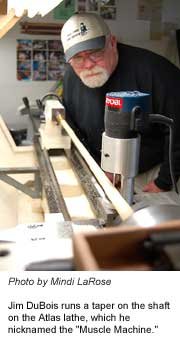Jim DuBois is a craftsman who uses unusual media like titanium, ivory, exotic woods and super glue. His craft is the meticulous building and repairing of pool cues. He enjoys the game of pool, and has placed in several tournaments. He says, “I love the heck out of this sport.” He understands the mechanics of the game, the effects of moisture and soft rails, but says, “Lately, building cues has saturated my game. It takes a lot of time.”
 DuBois once had a promising baseball career, which ended abruptly with a motorcycle accident and three major operations. He umpired professionally with the Western Baseball Association and girls fast pitch, going to the state playoffs and nationals in Fort Dent, Tukwila. When he and his wife, Cindy, moved to the Key Peninsula, he gave up umpiring.
DuBois once had a promising baseball career, which ended abruptly with a motorcycle accident and three major operations. He umpired professionally with the Western Baseball Association and girls fast pitch, going to the state playoffs and nationals in Fort Dent, Tukwila. When he and his wife, Cindy, moved to the Key Peninsula, he gave up umpiring.
DuBois retired in February 2003 from Tacoma Plywood, Inc. after 31 years and unloading 13,000-15,000 semis and 4,000 to 5,000 railroad cars. He says he always had an interest in wood. For 16 years, he practiced pool cue repair for his own use, and began building cues eight years ago, starting Pool Time Cue Repair in Lakebay. He is proud to tell of his cues being shipped to Switzerland, Atlanta, Texas and Michigan, but only spreads news of his business by word of mouth. He isn’t on the Internet because, he says, “How busy do I want to be?”
There are six or seven builders in the state of Washington, like Mike McDermott, a pool professional and antique dealer, and Roger Pattit, from Seattle, who “will tell you, he won’t show you,” how to build a cue. DuBois’ cues are crafted from purple heart, lace wood, bloodwood, western maple, quilted maple, spaultic alder, boagadi, cocobola and South African ebony. Some of the shafts are made from wood 200-250 years old, with 54 growth rings per inch — extremely compressed — which he reserves for specially designed sticks. He makes butterfly and layered pool cues, plain-jane and sneaky-pete cues. He wants to be known as “a guy that builds a decent stick.” His prices for a new stick range from $100 to $2,000. “It takes almost a year to turn down a shaft,” he explains. He has built a custom inlaid stick with monogram for $600. He has five original designs in his mind, designs which will be unique “humdinger collector’s items someday,” he predicts.
His shop out on South Head is neat, well-ventilated and organized. The ventilation is important because of the risk of cyanide poisoning from super glue fumes. He says such a business is difficult “out in the boondocks,” and he goes into town to “sniff out business” occasionally, returning with enough business to keep him busy for awhile. “There is nothing like bringing it (a cue) out here to put the professional touch on it,” he says. He can steam out dents, clean and wax, replace ferrules, rewrap with Irish Linen or leather, and replace tips with elk hide, shark hide, cowhide, llama, water buffalo or laminate. “I use Sumo, Sniper, and Elkmaster, but H. Moori is the best you can get, it is cured one year underground in fertilized soil, and sells for $40-50,” he explains.
In his shop, DuBois has nine lathes, six metal and four wood. Three years ago, he studied with a mentor, Dennis Diekman in Michigan, “one of the best butterfly builders.” Diekman had the first pool cue entered into display at the Smithsonian Institution. Under his tutelage, DuBois has learned tricks to reduce the time it takes to build a cue from 18 days to 30 hours; “using super glue has increased productivity tenfold,” he says. Other tricks are gleaned from his subscription to Pool and Billiards magazine, featuring tables, halls, sticks, shooting stance, education, etc.
“People don’t realize what all is involved” in cue maintenance, he says. For example, there are nine steps involved in cleaning a cue, a process that can be accomplished in about 10-15 minutes for which DuBois charges $12. “It is difficult to explain all the steps, and why it takes so much time” to do it right, he says. His personal preference for cue weight is 20 ounces. Some prefer a weight of 18 to 19 1/2, or 19 1/2 to 21 ounces. But he has made trick shot cues weighing 32 ounces.
There are places to learn the game, with trainers in Auburn, Kent, and Tacoma. He plays at Full Splice Billiards, a nonalcoholic hall in Tacoma, and at City Light Billiards in Tacoma. Having lost his wife in February 2004, DuBois says he needs closure and will downsize. “There is very little of my life I would change,” he says. His home is on the market; but he plans to stay on the Key Peninsula.
UNDERWRITTEN BY THE FUND FOR NONPROFIT NEWS (NEWSMATCH) AT THE MIAMI FOUNDATION, THE ANGEL GUILD, ADVERTISERS, DONORS AND PEOPLE WHO SUPPORT INDEPENDENT, NONPROFIT LOCAL NEWS